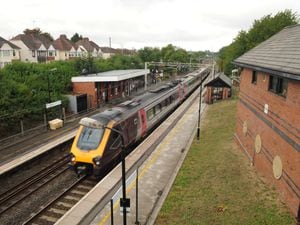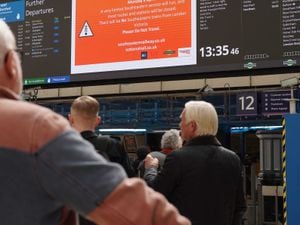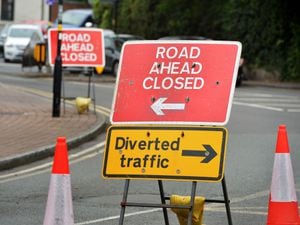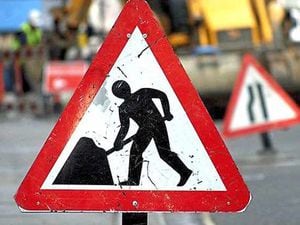Councillor praises decision to stop 'dangerous' smart motorways plan in region
The cancellation of planned smart motorways in the region has been welcomed by a Black Country council leader who described them as dangerous.
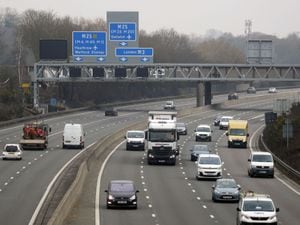
Councillor Mike Bird, Leader of Walsall Council said the cancellations were long overdue and the decision was the first positive thing he could say he had agreed with on the highways.
He said: "The decision is long overdue as they were the most dangerous and continue to be the most dangerous highway issues that I know.
"It is, without doubt, the first positive thing that I would say I 100 per cent support on the highway network.
"Safety has to be paramount without a shadow of a doubt and I think it's something which has been long overdue."
Walsall North MP Eddie Hughes also agreed that it was right to cancel the installation, saying the government had acted on the information available.
He said: "I would say that clearly, there have been some unfortunate accidents associated with smart motorways.
"It's completely reasonable that the government acts based on the information that it has from studies associated with those accidents."
The building of new smart motorways is being cancelled as Prime Minister Rishi Sunak acknowledged concerns about safety and cost.
Fourteen planned smart motorways – including 11 that are already paused and three earmarked for construction – will be removed from Government road building plans, given financial pressures and in recognition of the lack of public trust.
Which smart motorways are cancelled?
11 already paused:
M3 Junction 9 to 14
M40/M42 interchange
M62 Junction 20 to 25
M25 Junction 10 to 16
Hard shoulder to all lane running conversions:
M1 Junction 10 to 13
M4 - M5 interchange (M4 Junction 19 to 20 and M5 Junction 15 to 17)
M6 Junction 4 to 5
M6 Junction 5 to 8
M6 Junction 8 to 10a
M42 Junction 3a to 7
M62 Junction 25 to 30
3 earmarked for construction:
M1 North Leicestershire
M1 Junction 35A to 39 - Sheffield to Wakefield
M6 Junction 19 to 21A - Knutsford to Croft
Campaigners welcomed the move, but demanded the Government now return the hard shoulder on existing conversions.
The Department for Transport said the construction of these schemes would have cost more than £1 billion.
But the department added that the construction of two stretches of smart motorway at junctions six to eight of the M56 and 21a to 26 of the M6 will continue as they are already more than three quarters complete.
Existing stretches will remain but be subjected to a safety refit so there are 150 more emergency stopping places across the network.
Around 10% of England’s motorway network is made up of smart motorways.
They involve various methods to manage the flow of traffic, such as converting the hard shoulder into a live running lane and variable speed limits.
But there have been long-standing safety fears following fatal incidents in which vehicles stopped in live lanes without a hard shoulder were hit from behind.
In January 2022, the Government paused the expansion of motorways where the hard shoulder is used as a permanent live traffic lane.
This was to enable five years of data to be collected to assess whether they are safe for drivers.
In his Tory leadership campaign last summer, Mr Sunak vowed to ban them.
“All drivers deserve to have confidence in the roads they use to get around the country,” the Prime Minister said.
“That’s why last year I pledged to stop the building of all new smart motorways, and today I’m making good on that promise.
“Many people across the country rely on driving to get to work, to take their children to school and go about their daily lives, and I want them to be able to do so with full confidence that the roads they drive on are safe.”
Pressure had been mounting on the Government to scrap the routes, which have been criticised by MPs and road safety campaigners, including the RAC and AA.
Campaigner Claire Mercer, whose husband was killed on a smart motorway in South Yorkshire, welcomed the Government’s move but pledged to continue pushing for the hard shoulder to return on every road.
She told the PA news agency: “It’s great, it’s very good news.
“I’m particularly happy that it’s been confirmed that the routes that are in planning, in progress, have also been cancelled. I didn’t think they’d do that.
“So it’s good news, but obviously it’s the existing ones that are killing us. And I’m not settling for more emergency refuge areas.
“So it’s half the battle, but we’ve still got half the battle to go.”
Jason Mercer and another man, Alexandru Murgeanu, died in 2019 when they were hit by a lorry on the M1 near Sheffield after they stopped on the inside lane of the smart motorway section following a minor collision.
Sarah Champion, the Labour MP for Mr Mercer’s Rotherham constituency, said: “I’m relieved the Government has finally listened to motorists and common sense, but this announcement is long overdue and I need to see the detail before celebrating.
“Will the Government be returning the hard shoulder on existing conversions? Will the schemes currently in construction be restored? Why now when two parliamentary select committee inquiries, their own review and countless campaigns by family members of those who died on these death traps wasn’t enough to persuade them.”
AA president Edmund King said: “We have had enough coroners passing down their deadly and heart-breaking judgments where the lack of a hard shoulder has contributed to deaths.
“At last the Government has listened and we are delighted to see the rollout of ‘smart’ motorways scrapped…
“We would also like to see the hard shoulder reinstated on existing stretches in due course.”
RAC road safety spokesman Simon Williams said: “Our research shows all lane running smart motorways are deeply unpopular with drivers so we’re pleased the Government has finally arrived at the same conclusion.
“It’s now vitally important that plans are made for making the hundreds of existing miles of these types of motorway as safe as possible.”
Transport Secretary Mark Harper said: “We want the public to know that this Government is listening to their concerns.
“Today’s announcement means no new smart motorways will be built, recognising the lack of public confidence felt by drivers and the cost pressures due to inflation.”

